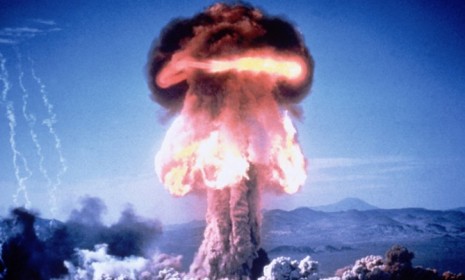Nuclear war: The answer to global warming?
Even a relatively confined, regional conflict would immediately cool the globe, says NASA. But a nuclear chill is hardly something to wish for

A free daily email with the biggest news stories of the day – and the best features from TheWeek.com
You are now subscribed
Your newsletter sign-up was successful
There's at least one, admittedly reprehensible, way to reverse global warming fast: Nuclear war. NASA researchers say even a limited nuclear conflict could trigger an "unprecedented" planet-wide cooling that could last several years. But the devastating effects of the plunge in temperatures, not to mention the other consequences of nuclear bombs, would hurt the world for generations. Here, a quick guide:
How much colder would the world get?
A regional nuclear war would immediately cause average global temperatures to drop by 2.25 degrees Fahrenheit for the next two to three years. The most extremely affected areas — the tropics, Europe, Asia, and Alaska — would cool by up to 7.2 degrees, according to computer models. Even a decade after detonation, average world temperatures would remain nearly a full degree lower.
The Week
Escape your echo chamber. Get the facts behind the news, plus analysis from multiple perspectives.

Sign up for The Week's Free Newsletters
From our morning news briefing to a weekly Good News Newsletter, get the best of The Week delivered directly to your inbox.
From our morning news briefing to a weekly Good News Newsletter, get the best of The Week delivered directly to your inbox.
Why would temperatures plunge so far?
The explosions would send dust, soot, and ash into the sky, blotting out the sun for weeks. Smoke from the resulting fires would carry five million metric tons of black carbon into the Earth's atmosphere, where it would absorb the sun's heat.
How big of a nuclear war would it take to cool the planet?
Not that extensive, relatively speaking. These researchers used computer models assuming a war involving 50 to 100 bombs as big as the one the U.S. dropped on Hiroshima in World War II. That translates into just 0.03 percent of the world's current nuclear firepower. TIME ominously pointed out that India and Pakistan already have enough bombs in their arsenals to do the trick.
A free daily email with the biggest news stories of the day – and the best features from TheWeek.com
Would cooler weather really be so bad?
Yes. The soot would create holes in the ozone layer that would let more of the sun's ultraviolet rays hit Earth. Global precipitation levels would fall by 10 percent. That plus colder air would cause widespread crop failures. Consider the famine that struck Indonesia in 1815, when a volcano erupted, sending up an ash cloud that caused what was known as "the year without summer." Oh, and don't forget the nuclear radiation.
Sources: National Geographic, TIME, Huffington Post, Digital Trends
-
 Political cartoons for February 14
Political cartoons for February 14Cartoons Saturday's political cartoons include a Valentine's grift, Hillary on the hook, and more
-
 Tourangelle-style pork with prunes recipe
Tourangelle-style pork with prunes recipeThe Week Recommends This traditional, rustic dish is a French classic
-
 The Epstein files: glimpses of a deeply disturbing world
The Epstein files: glimpses of a deeply disturbing worldIn the Spotlight Trove of released documents paint a picture of depravity and privilege in which men hold the cards, and women are powerless or peripheral